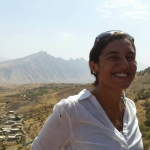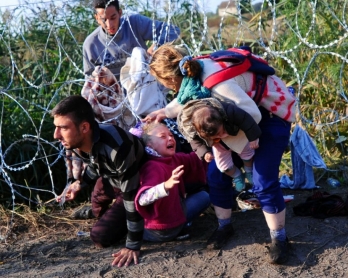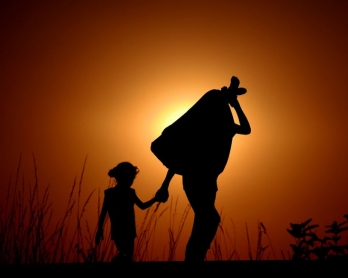‘Our’ Iraqi refugee family’s odyssey to freedom
Paris - It’s not every day that I get to write a story with a happy ending worthy of a 21st century fairytale. I had recently started in my new role as AFP’s deputy online planning editor when I heard the news.
The Iraqi family that award-winning photojournalist Aris Messinis, rising star of AFPTV Celine Jankowiak and I had followed through the Balkans at the peak of Europe’s migration crisis in 2015 had been granted asylum, in The Netherlands.
Their long, excruciating wait for the right of residence was over, and everyone I told at AFP was overjoyed. “You have to go and do a new story,” features editor Deborah Pasmantier said.
Aris, Celine and I were about to be reunited with the family whose odyssey to peace and freedom we will never forget.
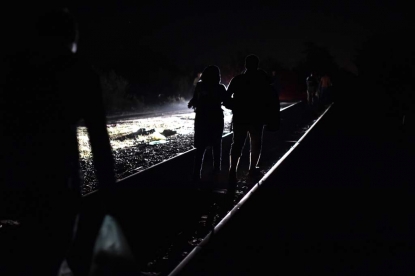 (AFP / Aris Messinis)
(AFP / Aris Messinis)It was sunrise in Gevgelija, a quiet town in the country now known as the Republic of North Macedonia. On September 3, 2015, hundreds of mainly Syrian, Iraqi and Afghan survivors of the desperate journey across the eastern Mediterranean waited to board a train that would take them to the Serbian frontier, the next stop on the so-called Balkan migration route that over 760,000 people ended up taking that year.
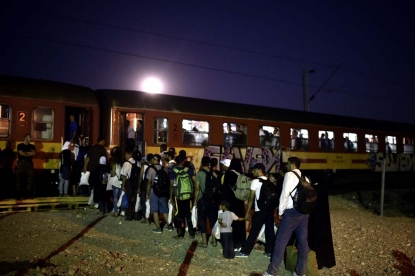
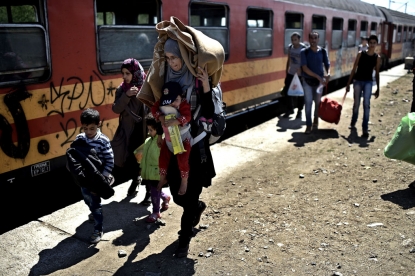 ( AFP/ Aris Messinis)
( AFP/ Aris Messinis)Among the migrants we saw that day were elderly people, mothers with their newborns, war-wounded amputees, lovers walking hand in hand, and many families with children. While I frantically scribbled notes, Aris and Celine were taking shots of a young father with a baby, followed by his strikingly pretty wife, who wore her hair up in a little bun.
“Serene, go talk to them. That is the family we have to follow,” Aris told me as he pointed towards Ahmad, Alia and four-month-old Adam, the Iraqi family whose roller-coaster journey we would end up tracking for five years.
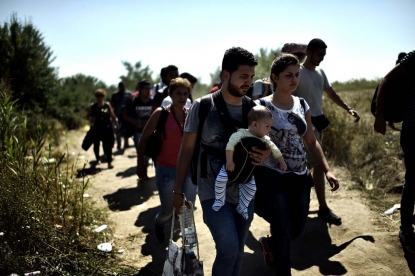
Aris, Celine and I had met a couple of days earlier in Thessaloniki, and we had an assignment to follow a family taking the Balkan route, documenting their journey from up close. It was a good idea, of course. As Celine put it would help the world see beyond the statistics flooding the media at the time from Europe’s biggest migration crisis since World War II.
But to be honest, I wasn’t sure we would succeed. The only way it would work was if we could find a family with the courage not just to brave possible death in the Mediterranean, but also to share their story with the world.
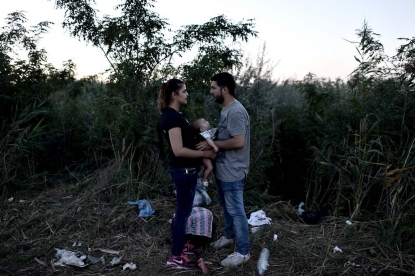 (AFP / Aris Messinis)
(AFP / Aris Messinis)Yet there they were. I actually asked Ahmad and Alia several times whether they really meant it when they consented to being shadowed. I explained that we would film and photograph them constantly, and that we wouldn’t stop if things got ugly. I also told them that I would annoy them with question after question, and that they would have to explicitly tell me if they didn’t want me to reveal parts of their tale. But they agreed without blinking, saying they had nothing to hide, and that they would be happy for us to become their travel companions.
While this was the first act of generosity by Ahmad and Alia that we would witness, it would by no means be the last. They may have felt that travelling with a team of international journalists might protect them. But I believe their deeper motivation was to show the world that while migration is part of the human condition, everyone deserves to be treated with dignity and respect, and that a parent would do anything to ensure a life in peace and freedom for their child.
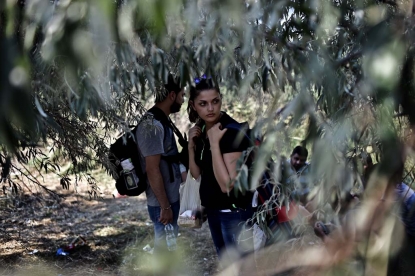
We crossed Europe with Ahmad, Alia and Adam at lightning speed, on trains, buses, in smugglers’ taxis and on foot through fields under cover of night. We shared everything with each other along the way, and started referring to them as “our family.”
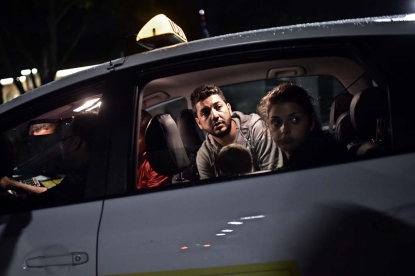 (AFP / Aris Messinis )
(AFP / Aris Messinis )As any journalist who has covered war or crisis knows, extreme situations bring people together even as entire nations are torn apart. Empathy, intuition and trust are not just positive character traits -- they can be life-saving.
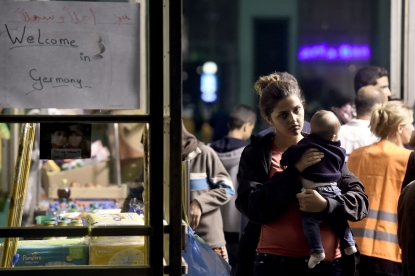 (AFP/ Aris Messinis)
(AFP/ Aris Messinis)We couldn’t possibly have known at the time where the journey would take us, and how 'our family’s' story would end. Looking back from Duiven, the leafy Dutch town they have now made their home, it feels almost like they were destined to succeed. They went through so much in order to gain the right to a safe haven in the country they had set their sights on from early on, because they had relatives there. They were such a beautiful family with so much to live for that surely their story deserved a happy ending.
But the world is seldom fair, and many people who were just as deserving drowned in the attempt to find safety in Europe. Many others are still waiting for their chance to start a new life, trapped in camps in Greece, Italy, Spain and beyond.
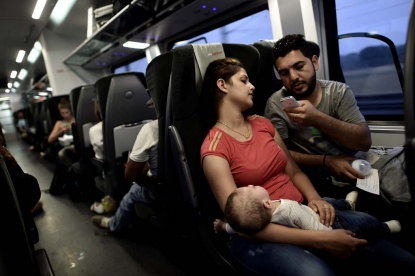 (AFP/ Aris Messinis)
(AFP/ Aris Messinis)Asked what he thinks the difference is between those who make it and those who don’t, Ahmad replies as he sips coffee in his brightly lit living room: “Pure luck. The difference between them is luck.”
With populism rising in Europe and beyond, this is a painful indictment of the humanist ideals that the European Union represents for millions around the world.
Among the most memorable episodes of the route was the illegal crossing from Serbia into Hungary, in tow of an Iraqi Kurdish smuggler with bright green eyes and a violet T-shirt. The family wanted to elude the Hungarian authorities to avoid the risk of being thrown into a camp and to have their journey cut short. So they paid the smuggler 100 euros per head to lead them into the country. Once there, they paid another man, this time a taxi driver with Nazi tattoos, an exorbitant sum to drive them to Budapest.
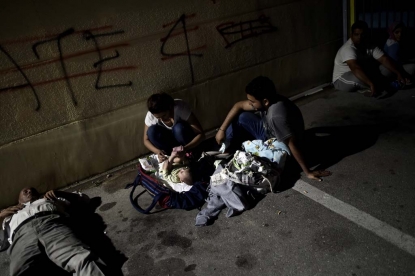 (AFP / Aris Messinis)
(AFP / Aris Messinis)There, the welcome was grim. No hotel, not even a brothel, would host them. They ended up cradling Adam to sleep in an alley. All of Alia’s attempts at maintaining her composure fell away as she collapsed in tears on the pavement.
At the time, I wrote about how strange it felt to enter the EU illegally, and to witness such a lovely family being treated with such indignity. Like many journalists I had crossed a couple of borders illegally before, but it had never occurred to me that I would ever follow in the footsteps of a smuggler to enter Europe.
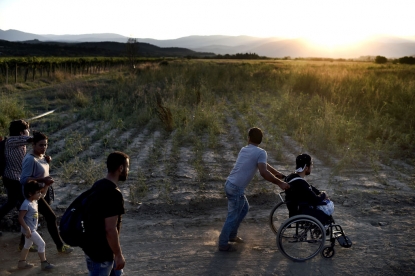 (AFP / Aris Messinis)
(AFP / Aris Messinis)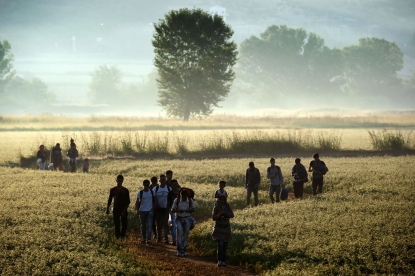 ( AFP / Aris Messinis)
( AFP / Aris Messinis)That was when the gulf between us and the family felt widest. Celine, Aris and I knew that if we were to be stopped by the Hungarian police, we might get into trouble, but it would be a momentary annoyance. For the Iraqis, it would mean the end of the road.
The difference between us? We journalists were born in the UK, France and Greece, and we were on a mission for one of the world’s top news agencies. They were born in Iraq, and they were running for their lives. The feeling of safety that we have always enjoyed, and the freedom that comes with it, were precisely what Ahmad and Alia wanted for Adam.
As journalists, it is part of our job to maintain an emotional distance from our stories. Only by keeping that distance can we report objectively and maintain the standard of neutrality that guarantees the credibility of our work. But we are also human beings, and witnessing injustice and terrible pain exacts a price on us too. It is also when we are able to understand and portray from up close the people we are reporting on that our work is of any real value.
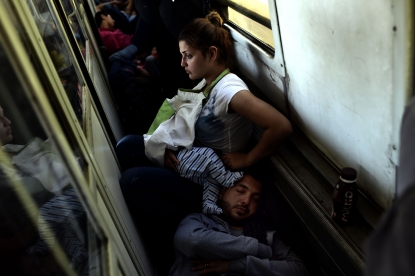 (AFP / Aris Messinis)
(AFP / Aris Messinis)Aris wrote a memorable AFP blog post in November 2015 in which he recounted putting down his camera and jumping into the sea to rescue migrants from drowning off Greece’s shores. I am honoured to work with such a man. While objectivity is key, the idea that journalists can only witness tragedy, yet must remain somehow aloof, baffles me.
Our initial mission to follow Alia, Ahmad and Adam through the Balkans started off as any classic reporting assignment would. While we were among the first, we were by no means the only news organisation to follow a family along the migration route in the autumn of 2015.
But what was unique in our work was the follow-up over the five years that ensued. In December 2015, Celine and I visited their shelter in the northern Dutch town of Leeuwarden, this time with photojournalist Emmanuel Dunand. There, we reported on their grim living conditions in an exhibition centre-turned-shelter, host to hundreds of people who had believed they would be welcomed with open arms in Europe.
With AFP’s encouragement, we remained in touch with the family, mainly over Viber and Whatsapp. Ahmad described in intricate detail the first interview he had with the Dutch authorities. He shared with me the anguish of seeing two consecutive asylum applications rejected. He sent me photographs of Alia, to show how she was suffering stress-induced hair loss.
But they also shared pictures of beautiful Adam as he grew. He was just a tiny baby when we first met them. He went on to learn to walk and talk while moving from one migrant shelter to another as his parents waited to obtain asylum. By the time they got their residence permits in August 2019, he was four years old and ready for school. And when we visited them in their new home in Duiven in September 2020, they welcomed us like family.
Our visit to Duiven was short and we worked long hours, but there was so much joy and laughter. While Celine and I filmed an interview with Ahmad in their living room, Aris played Lego with Adam. And seeing Adam ride his bike to school in the mornings brought tears to my eyes. I just couldn’t believe their dream had come true, and I felt so honoured to have witnessed it.
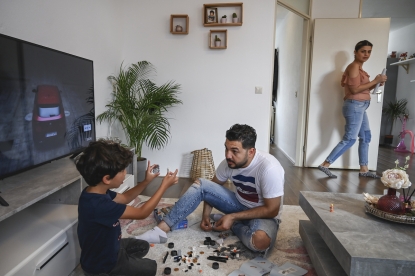 (AFP/ Aris Messinis)
(AFP/ Aris Messinis)With the worst behind them, Ahmad and Alia have yet to perfect their Dutch and become financially independent.
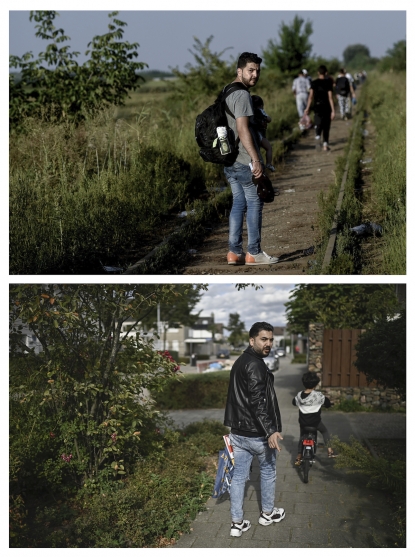 (AFP / Aris Messinis)
(AFP / Aris Messinis)They are officially refugees, and while the state offers them protection, they cannot vote in national elections -- meaning that they cannot yet exercise their full democratic rights and duties in their new home. But they are optimistic. Alia is now pregnant with her second child, who like its parents will one day be an EU citizen.
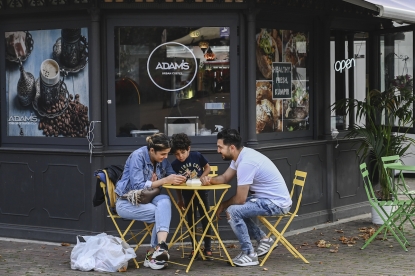 (AFP / Aris Messinis)
(AFP / Aris Messinis)For me, they are real-life heroes who refused to bow to their fate. As they prepared to take the boat from Turkey to Greece in the summer of 2015, Alia told her husband: “Either we live together or we die together.” They knew their journey would be riddled with peril, but for their son’s sake, they had to be courageous.
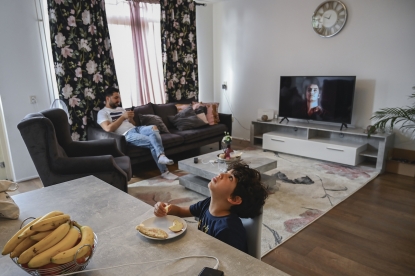 (AFP / Aris Messinis)
(AFP / Aris Messinis)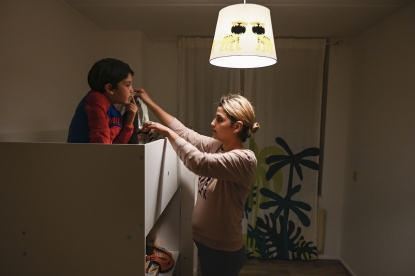 (AFP / Aris Messinis)
(AFP / Aris Messinis)So it was that they carved out a new destiny for their child, in a quiet Dutch town, far from the danger that plagues their beloved Baghdad. And they’re ready for the future.
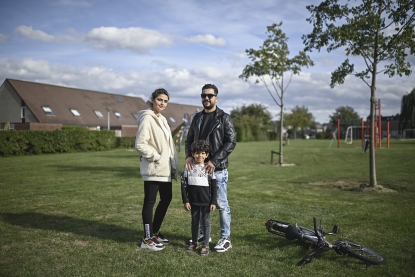 (AFP/ Aris Messinis)
(AFP/ Aris Messinis)Serene Assir is an AFP correspondent based in Paris. Aris Messinis is based in Athens and Céline Jankowiak works in Vienna. This blog was edited by Kate Millar and Michaëla Cancela-Kieffer in Paris. This is the latest of a series of blogs Serene has written about this journey.


